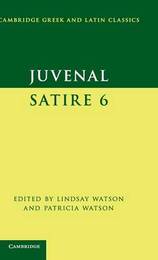
|
Juvenal: Satire 6
Hardback
Main Details
Description
Juvenal's sixth Satire is a masterpiece of comic hyperbole, an outrageous rant against women and marriage which, in its breadth and density, represents the high point of the misogynistic literature of classical antiquity. The Introduction situates Juvenal within the wider tradition of Roman satire, interrogates afresh the poem's architecture and recurrent themes, shows how Juvenal systematically attributes to his monstrous women the inverse of the Roman wife's canonical virtues, traces the various literary currents which infuse the Satire, and lastly addresses the much-discussed issue of the poetic voice or persona from a sociohistorical as well as a theoretical perspective. Above all, the commentary strives to locate Juvenal in his historical, literary and cultural context, while simultaneously affording assistance with the nuts and bolts of the Latin, and always keeping in view two key questions: what was Juvenal's purpose in writing the Satire? How seriously was it meant to be taken?
Author Biography
Lindsay Watson has recently retired as Associate Professor of Classics at the University of Sydney. He is a Fellow of the Australian Academy of the Humanities. His major publications are Arae. The Curse Poetry of Antiquity (1991), A Commentary On Horace's Epodes (2003) and (with Patricia Watson) Martial: Select Epigrams (Cambridge, 2003). He is presently engaged on a brief monograph on Martial, co-authored with Patricia Watson. Patricia Watson is an honorary associate of the Department of Classics and Ancient History at the University of Sydney, where she was Senior Lecturer in Latin prior to her retirement. She is the author of a monograph, Ancient Stepmothers: Myth, Misogyny and Reality (1995), as well as numerous articles on Roman poetry. This is her second volume for the Cambridge Greek and Latin Classics series, the first being a commentary on selected epigrams of Martial in 2003.
|